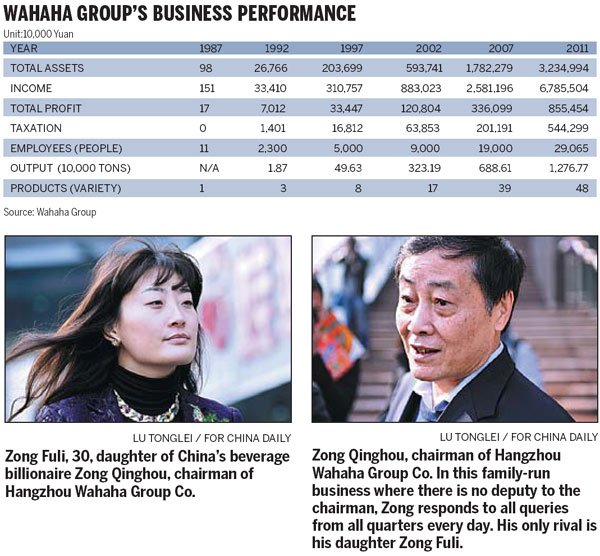Drinks tycoon in surprise move
Updated: 2013-01-10 09:38
By Wang Zhuoqiong in Hangzhou (China Daily)
|
|||||||||||
During our interview he stood up and walked into the next room, returning in a cashmere suit. "It is Gregory from Italy," he said, excitedly. "Warm and light. Only 4,000 yuan ($645)."
Zong is trying to sell his new venture - an ambitious plan to develop a Chinese version of London's famous store Harrods or Paris' Lafayette.
WAOW Plaza, a name partly coined from the initial characters from Wahaha and Europe in Chinese, is expected to develop into a chain of high-end shopping centers for European and American luxury brands.
But unlike the first-tier luxury brands, the brands to be sold at WAOW, while being well designed and popular, are largely unknown by Chinese customers, Zong said. He also plans to sell some brands from the United States and the United Kingdom. "They are good at innovation and update their product lines quickly."
|
 |
The first shopping mall opened last month in Hangzhou, having been established in just four months. Retail experts are worried the facility's simple layout, scarcity of visitors and the fact that Zong has moved out of his comfort zone, where the business return is much faster, do not bode well.
"Nothing at an early stage is perfect," Zong said, in his low but firm voice. "But it will grow quickly."
Zong insists his experience in selling soft drinks can be used in the luxury sector. The secret is to shorten distribution channels to save costs while speeding up advertisement and development, he said.
Loathing the high cost of first-tier luxury brands, Zong's model is to establish a buying system that entails importing products from international producers directly to lower the prices.
"We need luxury goods that are affordable to younger generations," he said. "Chinese white collar workers have grown smarter and smarter and question whether it is worth buying a 100,000-yuan bag."
According to a survey by Roland Berger Strategy Consultants in 2011, brand awareness is important for Chinese buyers of luxury goods, more so than design, quality and price. Many brands are rejected in China because they are not known, not because it doesn't suit the potential customer. But the report said in the future the question of "whether a brand suits me" would become a more important factor for Chinese people when deciding whether to buy a luxury good.
The idea to start the retail business emerged last June when Zong discovered from his overseas trips that second-tier luxury products of good quality do not have to be so expensive if unnecessary distribution methods are cut.
He led an investment team to Italy, France and Spain and brought back brands such as Castangia Dal and ANNA, from Italy and Groc from Spain. His other deals included Italian wine and olive oil.
Related Stories
Wahaha opens 1st department store 2012-11-29 13:37
Wahaha boss tops China rich list 2012-10-13 09:27
Wahaha eyes snacks business 2012-08-31 10:44
Wahaha runs to buy British snack brand KP 2012-08-21 10:54
Wahaha in the running to buy British snack brand KP 2012-08-21 07:41
Wahaha eyes Australian dairy farm investment 2012-03-06 08:10
Today's Top News
President Xi confident in recovery from quake
H7N9 update: 104 cases, 21 deaths
Telecom workers restore links
Coal mine blast kills 18 in Jilin
Intl scholarship puts China on the map
More bird flu patients discharged
Gold loses sheen, but still a safe bet
US 'turns blind eye to human rights'
Hot Topics
Lunar probe , China growth forecasts, Emission rules get tougher, China seen through 'colored lens', International board,
Editor's Picks

|

|

|

|

|

|





